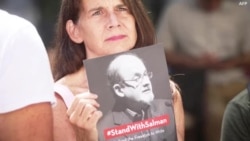On August 15, Iranian Foreign Ministry spokesman Nasser Kanaani denied any Iranian connection to the stabbing of award-winning British-Indian author Salman Rushdie during an event in New York.
On August 12, Hadi Matar, a 24-year-old New Jersey man, attacked Rushdie at an education center in Chautauqua, New York, as the author was preparing to deliver a lecture there on the United States as a refuge for exiled writers and artists. Matar stabbed Rushdie 10 to 15 times in the neck and abdomen. Rushdie survived the attack.
Rushdie was born in India to a Muslim family and later became a British citizen after moving to the United Kingdom. His novel, “The Satanic Verses,” published in 1988, stirred controversy among Muslims because of the author’s satirical depiction of Islam. In 1989, Iran’s then Supreme Leader, Ayatollah Ruhollah Khomeini, issued a fatwa (Islamic edict) calling on Muslims to kill the author.
During the Iranian Foreign Minstry’s weekly press briefing in Tehran on August 15, spokesman Kanaani blamed Rushdie himself and his supporters for the attack on the writer. Kanaani said the support Rushdie received after the attack was an “insult against all religions.”
“We seriously and definitively deny the connection between Salman Rushdie's assailant and the Islamic Republic,” he said.
That is misleading. Although no evidence has surfaced showing Iran’s direct involvement in the attack on Rushdie, Iran’s 33-year-old fatwa against the author continues to incite extremist threats against him and his supporters.
In an interview from prison with the New York Post published on August 17, Rushdie’s attacker denied he had been in contact with Iran’s Revolutionary Guard Corps. Still, Matar claimed Rushdie had “attacked Islam” and called Khomeini “a great person.”
Matar is being held without bail, and Chautauqua County District Attorney Jason Schmidt said that was justified by the fact that Matar’s “targeted, unprovoked, preplanned” attack on Rushdie was “sanctioned by larger groups and organizations well beyond the jurisdictional borders of Chautauqua County.”
Over the years, various groups connected to the Iranian regime have put bounties on Rushdie’s head totaling millions of dollars.
Iranian media hailed Rushdie’s attacker and hardline Iranian clergy celebrated the stabbing. Iran’s Fras News Agency published a video gloating over the attack and calling Rushdie “an apostate whom hellfire awaits.”
The Tehran-based Mehr News Agency published an article headlined “Apostate Author Salman Rushdie, Clandestine Life Like Satan.”
Iran’s state-owned Press TV described Rushdie as the “infamous author of the blasphemous anti-Islam book.”
Khomeini’s fatwa did not simply call on Muslims to kill Rushdie. It also declared “all those involved in its publication who are aware of its content are sentenced to death.”
In 1989, the year Khomeini issued his fatwa targeting Rushdie, The New York Times, citing Reuters, reported that a Khomeini aide, Hassan Sanei, offered a reward to ''anyone who would punish this mercenary of colonialism for his shameful act.''
Sanei said his charity, the June Fifth Foundation, would pay $1 million to a foreigner or $3 million to an Iranian to kill Rushdie, calling his murder a “holy crusade.”
The fatwa forced Rushdie to go into hiding for several years and to travel with security protection while using the pseudonym Joseph Anton.
It also instigated attacks against translators and publishers of Rushdie’s work. In 1991, Ettore Capriolo, who translated “The Satanic Verses” into Italian, was stabbed in Milan, Italy. Eight days later, the novel’s Japanese translator, Hitoshi Igarashi, was found stabbed to death in his office at Tsukuba University in Tokyo.
William Nygaard, a Norwegian publisher who put out a translation of Rushdie’s book, was shot three times and wounded outside his home in 1993. In 1994, Naguib Mahfouz, an Egyptian writer and Nobel Prize laureate for literature, was stabbed and wounded outside his home in Cairo after he denounced Khomeini’s fatwa.
In 1998, then Iranian President Mohammad Khatami said Rushdie’s case had “finished.” Tehran said it would neither take action threatening the author's life nor incite anyone else to do so.
But Iranian government officials and clergy continued to incite the public against him.
In 2005, Iran Supreme Leader Ayatollah Ali Khamenei revived his predecessor’s fatwa, saying that Islam authorized Rushdie’s killing as an apostate.
The bounty on Rushdie’s head has increased over the years.
In 2012, Sanei raised his bounty on Rushdie to $3.3 million after the release of an anti-Islam film that stirred a violent response from ultra-conservative Muslims. Rushdie had nothing to do with the production of the movie and even criticized it.
“Surely if the sentence of the Imam [Ayatollah Khomeini] had been carried out, the later insults in the form of caricatures, articles and the making of movies would not have occurred," Sanei said.
In 2016, Reuters reported that Iranian state-run media outlets added $600,000 to the bounty on Rushdie.
In June 2012, Iran released a video game to teach the new generation about the author’s “sin.” The game, called “The Stressful Life of Salman Rushdie and Implementation of His Verdict,” was developed by the Iranian state-sponsored Islamic Association of Students and introduced during the country's second International Computer Games Expo, hosted by Tehran.
The developers of the game said they were experiencing production delays. The Guardian reported that little had been revealed about the game, but the title suggests the player's mission is to carry out the death fatwa against Rushdie.






